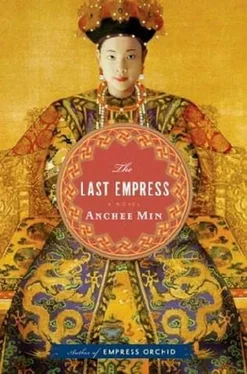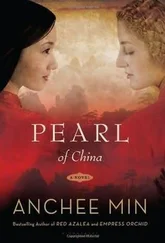I dared not have the dream interpreted, because in Chinese mythology rusty nails represented remorse and regret.
I couldn't have done what I did without the support of Yung Lu. My feelings for him would deepen over time, but our physical love would remain a thing of dreams. Every day I felt the absence of a man in my life. I worried more, however, about my son. Almost ten years before, I had lost a husband, but my son had lost his father. It was doubly tragic to my mind. It meant that Tung Chih would have to assume the full responsibilities of his position and so miss out on childhood. The joys of carefree days were not to be. Already, young as he was, I could detect a restlessness about him that occasionally broke out in hot flashes of temper.
Tung Chih needed a male hand to guide him. That was the second part of the tragedy. He was not only being hurried to assume a difficult role before his time, he also had no one on whom to model his character and behavior. In a court riven by political tension there were few father figures who did not also bring with them some hidden agenda.
Yung Lu and Prince Kung were the two men I had hoped would fulfill the role. But the conflict over Sheng Pao had made that difficult. Yung Lu had enjoyed great popularity until he took my side. Now his influence was in question. And I would soon begin to sense how deeply resentful Prince Kung was at my outmaneuvering him to claim the life of his old ally.
If I had expected to fight Governor Ho Kui-ching and General Sheng Pao, I never expected to have to fight my brother-in-law Prince Kung. Our histories had been so intertwined for so long that an unraveling of our relationship was not something I was prepared for. Since the crisis that followed my husband's death in Jehol, we had been important, even essential, allies. Kung had remained behind in Peking as the court fled the approaching foreign armies and had the humiliating task of negotiating with the occupying invaders. When Grand Councilor Su Shun attempted to seize power in the exiled court beyond the Great Wall, Kung was still in Peking and free to organize a countercoup. More than any other man, he had saved Nuharoo, myself, and young Tung Chih.
And we were friends-or at least I felt affection for him and believed I understood what motivated him. He had genuine talent and was, I'd always thought, more capable than his brother, who ended up on the throne. More reserved and more disciplined than Hsien Feng, Prince Kung could seem cold, but at least he didn't let bitterness infect him. For this he had my respect, and that of much of the court. I had always felt that he acted for the good of China and not for his own selfish purposes.
But these were difficult times. Conflict swirled around us, coming from within as well as without, and the tensions led to a poisonous atmosphere that pitted faction against faction in the court.
It started slowly, but it became clear that Kung was frequently going around us when conducting court business. This was just what had happened in Jehol, the manipulative Su Shun insisting that Nuharoo and I need not trouble ourselves with the work of the court, which would be better left to men. In so many ways, Prince Kung made it clear to Nuharoo and me that he wanted us to be sisters-in-law, not political partners.
"It's true that as females we might lack knowledge of the foreign powers," I argued, "but that doesn't mean our rights should be cast aside."
Without bothering to confront us, Prince Kung simply continued to go around us.
I tried to get Nuharoo to protest with me, but she didn't share my concern. She suggested that I forgive Prince Kung and move on. "Preserving harmony is our family duty," she said, smiling.
Without the daily reports being supplied to me, I had no idea what was going on. I felt blind and deaf when asked to make decisions during audiences. Prince Kung led the foreigners to believe that Nuharoo and I were mere figureheads. Instead of properly addressing Tung Chih in their proposals, the foreign powers addressed Prince Kung.
Tung Chih was nearly twelve when the Kung situation became intolerable. He would assume his full role as Emperor in a matter of a few years-that is, if there was still a role left for him to fulfill. In audiences he was unaware of the conflict going on just below the surface, but he could sense my own discomfort. The greater strain between us only made him more eager to avoid his duties. While Tung Chih sat tapping his foot or staring off into space until the audiences ended, I could only look out at the assembled ministers, nobles and subjects and feel that I was failing my son.
I realized that unless I convinced Nuharoo that she had much to lose, she would not offer her support. My son would be Emperor in name only while his uncle would wield the actual power. The reason that Governor Ho's and General Sheng Pao's executions encountered resistance was because the men were Prince Kung's friends. At my insistence the executions were eventually carried out, but now I realized how dear my "bloody debt" was to be.
Unprepared and often speechless, Nuharoo and I allowed Prince Kung to conduct the audiences as if we did not exist. The disrespect was so obvious that the court soon felt free to openly ignore us. Yung Lu feared that the army would follow suit.
I knew that I had to stand up for myself and Tung Chih, and it had to be soon. When a low-ranking officer from a northern town sent a letter complaining about Prince Kung, I sensed the moment had arrived.
Within two hours I had composed an edict that presented the case against Prince Kung. I wrote it carefully and stuck to the facts, avoiding any unnecessary slights to the character of my brother-in-law. Then I did the most difficult thing: I summoned my son and attempted to explain what we were about to do. Tung Chih's face went blank and his eyes widened. He looked so young to me, so unprotected, even in his glorious silk robes emblazoned with the Imperial symbol. I hadn't meant to frighten him, and sorrow filled my heart. Still, I needed him to understand.
Then, in the name of my son, I sent for Prince Kung.
A stunned silence settled over the audience as Tung Chih read the edict I had written and placed in his hands. It seemed to take the court by surprise, for no one challenged its claims. The night before, I had managed to persuade Nuharoo to be on my side, although she was absent at the announcement. In the edict I listed the numerous laws Kung had violated. My argument was strong and my evidence solid. My brother-in-law had no choice but to acknowledge that he had committed the wrongdoings.
I humbled Prince Kung by stripping him of all his posts and titles.
That same evening I asked Yung Lu to speak privately with him. Yung Lu made Kung understand that to unite with me was his sole option. "As soon as you make a public apology," Yung Lu promised on my behalf, "Her Majesty will grant back all your posts and titles."
My action was praised by Prince Kung's enemies as "letting go of a dangerous beast." They begged me not to reinstate him. These men had no idea what I wanted from Prince Kung. They couldn't imagine that punishing him was the only way for the two of us to get back together. To be treated as an equal was all I was asking.
To put an end to the rumor that Prince Kung and I were enemies, I issued another edict, granting Kung permission to do something he had long dreamed of: opening an elite academy, the Royal School of Science and Mathematics.
Tung Chih complained about a stomachache and was excused from attending the morning audience. I sent An-te-hai to check on him in the afternoon. My son would turn thirteen this year, and he had been Emperor for seven years. I understood why he hated his duties and would run away whenever possible, but still, I was disappointed.
Читать дальше












